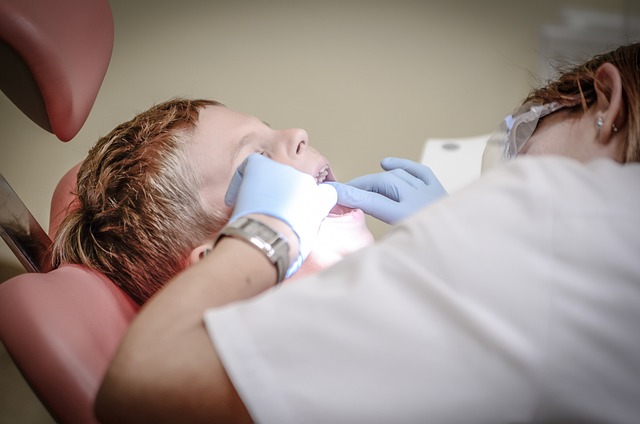Teeth Extraction: Discover the Role of Periodontists!
Welcome, dear readers, to an informative article that delves into the fascinating world of teeth extraction and shines a spotlight on an unsung hero in this field – the periodontist. Whether you have experienced the unsettling prospect of a tooth extraction yourself or are just curious about the pivotal role played by these specialists, we invite you to join us on this journey of discovery. In a friendly tone, we will explore the reasons behind tooth extractions, the importance of periodontists, and answer some common questions you might have about this dental procedure. So sit back, relax, and let us unravel the mystery behind teeth extraction with a touch of friendliness and a wealth of knowledge!
1. Understanding the Importance of Teeth Extraction for Oral Health
Teeth extraction might sound intimidating, but it plays a crucial role in maintaining optimal oral health. By removing problematic teeth, your dentist can prevent further complications and protect the health of your remaining teeth. Let’s explore why teeth extraction is important and how it contributes to your overall wellbeing.
Preserving Oral Health:
- Eliminating Tooth Decay: Extracting severely decayed teeth prevents the spread of decay to neighboring teeth.
- Preventing Gum Disease: Extraction reduces the risk of gum disease caused by overcrowding or impacted teeth.
- Protecting Surrounding Teeth: Removing damaged or infected teeth helps safeguard the health and alignment of adjacent teeth.
Resolving Orthodontic Issues:
- Addressing Overcrowding: Extraction creates space for proper alignment of teeth, improving the effectiveness of orthodontic treatments.
- Treating Impacted Teeth: Removing impacted teeth, commonly wisdom teeth, avoids potential pain, infection, and tooth damage.
- Enhancing Facial Structure: Extracting teeth can help prevent jaw problems and improve the overall symmetry of your face.

2. Periodontists: The Specialists Who Perform Teeth Extraction
Periodontists are dental specialists who have extensive training and knowledge in treating gum diseases and performing teeth extraction. When it comes to extractions, these professionals are your go-to experts. Whether it’s a simple tooth extraction or a more complex surgical procedure, periodontists are highly skilled in ensuring a smooth and comfortable experience for their patients.
Here are a few reasons why you might need an extraction and how periodontists can help:
- Damaged or Decayed Teeth: If a tooth is severely damaged or decayed beyond repair, a periodontist can remove it to alleviate pain and prevent further complications.
- Impacted Teeth: Periodontists are well-equipped to extract impacted wisdom teeth or any other teeth that fail to emerge properly, ensuring the surrounding gums and teeth remain healthy.
- Orthodontic Treatment: Sometimes, teeth may need to be extracted to make space for braces or aligners. Periodontists can expertly remove these teeth, enabling efficient orthodontic treatment.
With their expertise and gentle approach, periodontists make teeth extraction a seamless process. By choosing a periodontist, you are putting your oral health in the hands of a specialist who will prioritize your comfort and provide exceptional care throughout the procedure.

3. When and Why Teeth Extraction is Necessary: A Closer Look
Teeth extraction, though it may sound intimidating, is sometimes necessary to promote oral health and overall well-being. Here we will delve deeper into when and why this procedure is required, so you can have a better understanding of its importance.
When is teeth extraction necessary?
- If a tooth is severely damaged due to trauma or decay and cannot be restored with conventional treatments such as fillings or crowns.
- When there is overcrowding in the mouth, and removal of a tooth is necessary to create space for proper alignment. This is often the case when orthodontic treatments are being considered.
- If a tooth is infected or abscessed, and antibiotics and root canal therapy are unable to resolve the issue, extraction may be needed to prevent further spread of infection.
- Impacted wisdom teeth, which are the third set of molars that may fail to emerge properly, often require extraction to avoid complications like pain, infection, and damage to neighboring teeth.
Why is teeth extraction necessary?
- To eliminate discomfort: Extracting a severely damaged or infected tooth can alleviate pain and improve oral health.
- To prevent complications: Removing overcrowded or impacted teeth can prevent misalignment, infection, and other complications that may arise.
- To improve oral health: Extracting a damaged tooth can prevent the spread of infection to neighboring teeth and gums, promoting a healthier mouth overall.
It’s important to note that teeth extraction is typically a last resort when other treatments have been exhausted. If you have concerns about tooth extraction, don’t hesitate to consult with your dentist, who can provide personalized guidance based on your unique situation.

4. Dental Diseases and Conditions That Might Require Teeth Extraction
Teeth extraction is sometimes necessary to maintain oral health and prevent further complications. Here are some dental diseases and conditions that may require tooth extraction:
- Severe Tooth Decay: When tooth decay progresses to an advanced stage, it can cause severe damage to the tooth structure. In such cases, extraction may be necessary to prevent the decay from spreading to neighboring teeth and causing further infection.
- Gum Disease: Advanced periodontal disease can lead to the destruction of the supporting tissues and bone around the tooth. If the tooth becomes loose and cannot be saved through other dental treatments, extraction may be the best option to prevent the spread of infection.
- Impacted Wisdom Teeth: Wisdom teeth, also known as third molars, may not have enough space to properly emerge and align with other teeth. This can result in pain, infection, and damage to adjacent teeth. In such cases, extraction is often recommended to alleviate discomfort and prevent future dental problems.
It is important to note that tooth extraction should always be carried out by a qualified dentist or oral surgeon, who will thoroughly assess your dental condition and advise you on the best course of treatment. If you experience any symptoms related to the above conditions, it is advisable to seek prompt professional help to determine whether teeth extraction may be necessary.

5. The Role of Periodontists in Preserving Overall Oral Health
Periodontists play a crucial role in maintaining overall oral health. These specialized dentists focus on preventing, diagnosing, and treating diseases that affect the gums and supporting structures of the teeth.
Here are some key ways in which periodontists contribute to preserving your oral health:
- Diagnosing and treating gum diseases: Periodontists have expertise in identifying and managing various gum conditions, such as gingivitis and periodontitis. They can recommend appropriate treatment plans, which may include deep cleanings, scaling and root planing, or gum surgery, to alleviate infection, restore gum health, and prevent further damage.
- Performing dental implant procedures: When it comes to replacing missing teeth, periodontists are skilled in placing dental implants. These permanent, natural-looking tooth replacements can help restore your ability to eat, speak, and smile comfortably.
6. What to Expect: The Process of a Teeth Extraction Procedure
When it comes to having a teeth extraction procedure, it’s completely normal to feel a little uneasy or unsure about what to expect. That’s why we’ve put together this guide to help you understand the process and alleviate any concerns you may have:
Consultation: The first step is to schedule a consultation with your dentist. During this appointment, they will assess your oral health, take X-rays if necessary, and discuss the reasons for the extraction. This is also the perfect time to ask any questions or voice any concerns you may have.
Anesthesia: Before the extraction begins, your dentist will administer a local anesthetic to numb the area around the tooth. This ensures that you won’t feel any pain during the procedure. If you’re feeling particularly anxious, they may also offer some sedation options to help you relax.
Extraction: Once you’re numb and comfortable, the dentist will carefully remove the tooth from its socket. In some cases, they may need to make an incision in the gum or gently rock the tooth back and forth to loosen it. Don’t worry, though – you won’t feel any pain, just some pressure.
Aftercare: After the extraction, your dentist will provide you with detailed instructions to ensure proper healing. You may be advised to avoid certain activities, such as smoking or using straws, that could dislodge the blood clot that forms in the empty socket. Pain medication or antibiotics may also be prescribed to manage any discomfort or prevent infection.
Remember, every extraction is unique, and the process may vary depending on the complexity of the case. However, rest assured that your dentist will guide you through each step and ensure your comfort throughout the procedure.
7. Options for Tooth Replacement after Extraction: A Guide
When a tooth needs to be extracted, it’s important to consider the available options for tooth replacement. This guide will walk you through some of the most common and effective solutions, helping you make an informed decision that suits your specific needs.
Dental Implants: One of the most popular options, dental implants offer a permanent and natural-looking solution. This involves surgically placing a titanium post into the jawbone, which acts as a replacement root. Once the area has healed, a custom-made artificial tooth is securely attached to the implant. Dental implants are known for their durability, longevity, and ability to restore functionality.
Dentures: Dentures are removable replacements for missing teeth, often made of acrylic or a combination of metal and acrylic. Partial dentures replace a few missing teeth and are secured to neighboring natural teeth with metal clasps, while full dentures replace an entire arch of teeth. Dentures are a cost-effective option that offers restored appearance and basic chewing functionality.
Dental Bridges: Bridges consist of one or more artificial teeth, known as pontics, that fill the gap left by missing teeth. They are anchored onto the neighboring natural teeth or dental implants. Bridges not only restore functionality but also help maintain the shape of your face and prevent other teeth from shifting. While bridges are not as long-lasting as dental implants, they are a more affordable and non-surgical alternative.
Removable Partial Dentures: Similar to dentures, removable partial dentures replace one or more missing teeth. They are typically made of acrylic and are secured to neighboring natural teeth with metal clasps. Unlike bridges, partial dentures can be taken out for cleaning and do not require alteration of neighboring teeth. However, they may not provide the same stability and natural feel as implants or fixed bridges.
8. Tips for Preparing and Recovering from a Teeth Extraction
Having a tooth extraction can be a daunting experience, but with the right preparation and post-operative care, you can make your recovery much smoother. Here are some helpful tips to bear in mind before and after your extraction:
- Make sure to follow any pre-operative instructions given by your dentist, such as fasting prior to the procedure or avoiding certain medications.
- Stock up on soft and easy-to-eat foods before your extraction. Foods like soup, yogurt, mashed potatoes, and smoothies will be gentle on your healing gums.
- Arrange for transportation to and from the dental clinic on the day of your extraction. It’s best to have someone accompany you.
- On the day of the extraction, wear loose, comfortable clothing that won’t put pressure on the surgical site.
After your tooth extraction, here are a few tips to help with your recovery:
- Follow your dentist’s recommendations for pain management and take any prescribed medications as directed.
- Apply an ice pack to the outside of your cheek for the first 24 hours to help reduce swelling and discomfort.
- Take it easy for the first few days after the procedure and avoid any strenuous activities that can hinder the healing process or dislodge blood clots.
- Refrain from using straws, smoking, or consuming alcoholic beverages, as these can all delay the healing process and increase the risk of complications.
Remember, everyone’s recovery is different, so it’s essential to follow your dentist’s personalized instructions. By following these tips, you can minimize discomfort and promote a speedy recovery after your tooth extraction.
9. Frequently Asked Questions About Teeth Extraction and Periodontists
Here are some commonly asked questions about teeth extraction and periodontists:
1. Is tooth extraction painful?
No. Tooth extraction is generally performed under local anesthesia, so you won’t feel any pain during the procedure. However, you may experience some discomfort and swelling in the following days, which can be managed with over-the-counter pain medications.
2. How long does it take to recover from a tooth extraction?
The recovery time after a tooth extraction varies, but most people heal within one to two weeks. During this time, it’s essential to follow your periodontist’s instructions for proper care. You may be advised to avoid strenuous activities, eat soft foods, and gently rinse your mouth with a saltwater solution to aid the healing process.
- 3. Can I eat normally after tooth extraction?
- 4. Are there any potential complications after a tooth extraction?
Initially, you will need to stick to a soft food diet to avoid placing excessive pressure on the extraction site. As the healing progresses, you can gradually introduce solid foods back into your diet.
Although rare, complications can occur after tooth extraction. These may include infection, dry socket, excessive bleeding, or damage to adjacent teeth or nerves. It’s crucial to report any unusual symptoms or concerns to your periodontist promptly.
10. The Lifelong Benefits of Teeth Extraction and Periodontal Care
When it comes to maintaining overall oral health, teeth extraction and periodontal care play a crucial role. Many people have misconceptions about these procedures, but the truth is that they offer several lifelong benefits that can contribute to your overall well-being. Here are two key benefits:
- Prevention of Further Dental Issues: Teeth extraction may be necessary in cases of severe damage or decay, or to make space for orthodontic treatment. By removing problematic teeth, you can prevent the spread of infection, reduce the risk of tooth decay in adjacent teeth, and eliminate potential pain or discomfort. Periodontal care, on the other hand, focuses on the health of the gums and supporting structures. Regular cleanings and treatments can help prevent gum disease, which, if left untreated, can lead to tooth loss and other complications.
- Improved Overall Health: Proper oral care goes beyond just your teeth and gums; it can positively impact your overall health as well. Studies have shown a connection between gum disease and various systemic conditions such as heart disease, diabetes, and respiratory problems. By investing in teeth extraction and periodontal care, you are taking proactive steps to reduce the risk of these health issues and improve your quality of life.
Remember, maintaining oral health is a lifelong commitment, and professional dental care is essential. Regular visits to your dentist will ensure that you receive the necessary treatment and guidance for teeth extraction and periodontal care, leading to long-term benefits.
Frequently Asked Questions
Q: What is the role of a periodontist in teeth extraction?
A: Periodontists play a crucial role in the field of teeth extraction as they specialize in diagnosing and treating gum disease, which often leads to the need for tooth extraction.
Q: How can periodontists help prevent tooth extraction?
A: Periodontists focus on preventing tooth loss by addressing gum disease and other oral health issues. Through treatments such as scaling and root planing, they can help save teeth that may otherwise require extraction.
Q: Can periodontists perform routine extractions?
A: Yes, periodontists are qualified to perform routine tooth extractions. With their extensive knowledge of the gums and supportive structures, they have the expertise to ensure a smooth and comfortable extraction procedure.
Q: When is a periodontist recommended for tooth extraction?
A: A periodontist is usually recommended for tooth extraction when the tooth is impacted, meaning it is stuck beneath the gum line or partially erupted. Additionally, if the patient has severe gum disease or bone loss, a periodontist’s expertise may be required.
Q: Are there any alternatives to tooth extraction offered by periodontists?
A: Yes, periodontists explore all possible alternatives before resorting to tooth extraction. They explore treatments like gum grafts, bone regeneration, and dental implants to save the tooth and restore oral health.
Q: What should I expect during a tooth extraction with a periodontist?
A: Expect a comfortable experience when having a tooth extraction with a periodontist. They will start by numbing the area around the tooth and may offer sedation if needed. Once the tooth is removed, they will provide guidance on post-operative care to ensure proper healing.
Q: How long does the recovery process typically take after a tooth extraction?
A: The recovery process can vary depending on the complexity of the extraction and individual healing capabilities. However, most patients will experience improvement within one to two weeks, with complete recovery usually occurring within a month.
Q: How can I find a qualified periodontist for tooth extraction?
A: To find a qualified periodontist near you, you can consult your dentist or ask for recommendations from friends and family. Additionally, online directories and professional organizations like the American Academy of Periodontology can provide a list of certified periodontists in your area.
Q: Is tooth extraction painful?
A: Tooth extraction is generally not painful as the area will be numbed before the procedure begins. Periodontists also offer sedation options to ensure utmost comfort throughout the process.
Q: Is tooth extraction the only solution for severely damaged teeth?
A: While tooth extraction may be the best option for severely damaged teeth in some cases, it is not the only solution. Periodontists will always explore alternative treatments to save the tooth before considering extraction.
Conclusion
In conclusion, understanding the role of periodontists in teeth extraction is essential for maintaining optimal oral health. By specializing in the treatment of periodontal diseases and tooth loss, these highly skilled professionals play a crucial role in preserving the integrity of your smile. From initial diagnosis to post-extraction care, periodontists ensure a seamless and comfortable experience for each patient.
Remember, your periodontist is not just a dentist but a specialist who possesses in-depth knowledge and expertise in managing complex dental conditions. By entrusting them with your teeth extraction, you are guaranteed comprehensive care tailored to your specific needs. So, if you are facing the prospect of tooth removal, rest assured that periodontists are there to guide you every step of the way.
As you embark on your journey towards a healthier and more beautiful smile, make sure to maintain regular dental check-ups and adhere to your periodontist’s post-extraction instructions. By doing so, you can speed up the healing process and minimize any potential discomfort. Don’t hesitate to reach out to your trusted periodontist for any concerns or queries – they are always ready to provide the guidance and support you need.
In the end, your oral health is a lifelong commitment, and periodontists are your allies in this endeavor. Together, you can achieve a smile that not only looks great but also stands the test of time. So, take that first step, schedule an appointment with your periodontist, and be on your way to optimal oral health. Remember, a healthier smile leads to a happier you.






